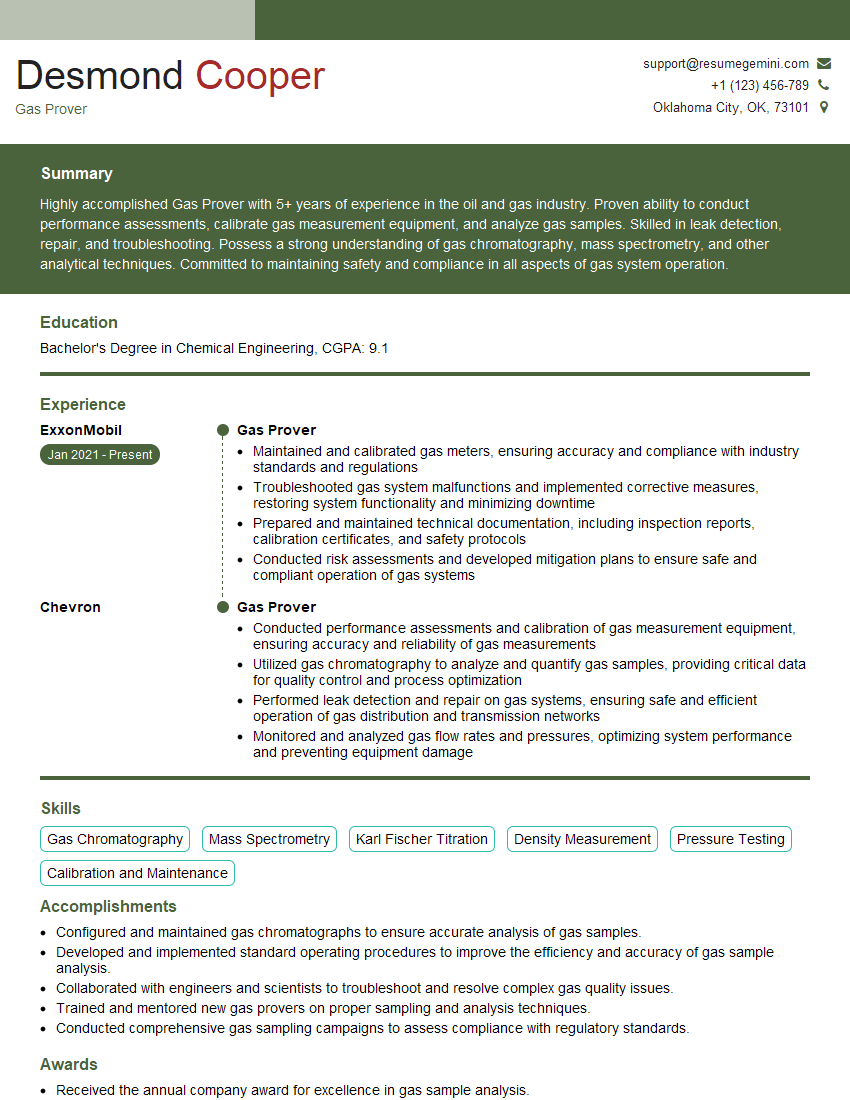Are you a seasoned Gas Prover seeking a new career path? Discover our professionally built Gas Prover Resume Template. This time-saving tool provides a solid foundation for your job search. Simply click “Edit Resume” to customize it with your unique experiences and achievements. Customize fonts and colors to match your personal style and increase your chances of landing your dream job. Explore more Resume Templates for additional options.

Desmond Cooper
Gas Prover
Summary
Highly accomplished Gas Prover with 5+ years of experience in the oil and gas industry. Proven ability to conduct performance assessments, calibrate gas measurement equipment, and analyze gas samples. Skilled in leak detection, repair, and troubleshooting. Possess a strong understanding of gas chromatography, mass spectrometry, and other analytical techniques. Committed to maintaining safety and compliance in all aspects of gas system operation.
Education
Bachelor’s Degree in Chemical Engineering
December 2016
Skills
- Gas Chromatography
- Mass Spectrometry
- Karl Fischer Titration
- Density Measurement
- Pressure Testing
- Calibration and Maintenance
Work Experience
Gas Prover
- Maintained and calibrated gas meters, ensuring accuracy and compliance with industry standards and regulations
- Troubleshooted gas system malfunctions and implemented corrective measures, restoring system functionality and minimizing downtime
- Prepared and maintained technical documentation, including inspection reports, calibration certificates, and safety protocols
- Conducted risk assessments and developed mitigation plans to ensure safe and compliant operation of gas systems
Gas Prover
- Conducted performance assessments and calibration of gas measurement equipment, ensuring accuracy and reliability of gas measurements
- Utilized gas chromatography to analyze and quantify gas samples, providing critical data for quality control and process optimization
- Performed leak detection and repair on gas systems, ensuring safe and efficient operation of gas distribution and transmission networks
- Monitored and analyzed gas flow rates and pressures, optimizing system performance and preventing equipment damage
Accomplishments
- Configured and maintained gas chromatographs to ensure accurate analysis of gas samples.
- Developed and implemented standard operating procedures to improve the efficiency and accuracy of gas sample analysis.
- Collaborated with engineers and scientists to troubleshoot and resolve complex gas quality issues.
- Trained and mentored new gas provers on proper sampling and analysis techniques.
- Conducted comprehensive gas sampling campaigns to assess compliance with regulatory standards.
Awards
- Received the annual company award for excellence in gas sample analysis.
- Recognized by the industry association for contributions to the field of gas prover technology.
Certificates
- Certified Gas Measurement Technician (CGMT)
- Certified Gas Chromatographer (CGC)
- Certified Mass Spectrometrist (CMS)
- Certified Pressure Tester (CPT)
Career Expert Tips:
- Select the ideal resume template to showcase your professional experience effectively.
- Master the art of resume writing to highlight your unique qualifications and achievements.
- Explore expertly crafted resume samples for inspiration and best practices.
- Build your best resume for free this new year with ResumeGemini. Enjoy exclusive discounts on ATS optimized resume templates.
How To Write Resume For Gas Prover
- Highlight your skills and experience in gas chromatography, mass spectrometry, and other analytical techniques.
- Quantify your accomplishments whenever possible, using specific metrics to demonstrate your impact.
- Proofread your resume carefully for any errors in grammar or spelling.
- Tailor your resume to each job you apply for, highlighting the skills and experience that are most relevant to the position.
Essential Experience Highlights for a Strong Gas Prover Resume
- Conducted performance assessments and calibration of gas measurement equipment, ensuring accuracy and reliability of gas measurements.
- Utilized gas chromatography to analyze and quantify gas samples, providing critical data for quality control and process optimization.
- Performed leak detection and repair on gas systems, ensuring safe and efficient operation of gas distribution and transmission networks.
- Monitored and analyzed gas flow rates and pressures, optimizing system performance and preventing equipment damage.
- Maintained and calibrated gas meters, ensuring accuracy and compliance with industry standards and regulations.
- Troubleshooted gas system malfunctions and implemented corrective measures, restoring system functionality and minimizing downtime.
- Prepared and maintained technical documentation, including inspection reports, calibration certificates, and safety protocols.
Frequently Asked Questions (FAQ’s) For Gas Prover
What is the primary role of a Gas Prover?
The primary role of a Gas Prover is to ensure the accuracy and reliability of gas measurements, as well as to maintain the safety and efficiency of gas systems.
What are the key skills and qualifications required for a Gas Prover?
Key skills and qualifications for a Gas Prover include a strong understanding of gas chromatography, mass spectrometry, and other analytical techniques, as well as experience in leak detection, repair, and troubleshooting gas systems.
What are the career prospects for a Gas Prover?
Gas Provers with experience and expertise can advance to roles such as Gas Analyst, Laboratory Supervisor, or Quality Control Manager.
What are the challenges faced by a Gas Prover?
Gas Provers may face challenges such as working in hazardous environments, dealing with high-pressure gas systems, and ensuring compliance with safety regulations.
How can I become a Gas Prover?
To become a Gas Prover, you typically need a Bachelor’s Degree in Chemical Engineering or a related field, as well as experience in gas chromatography, mass spectrometry, and other analytical techniques.
What are the typical working hours for a Gas Prover?
Gas Provers typically work regular business hours, but may be required to work overtime or on weekends during emergencies or outages.